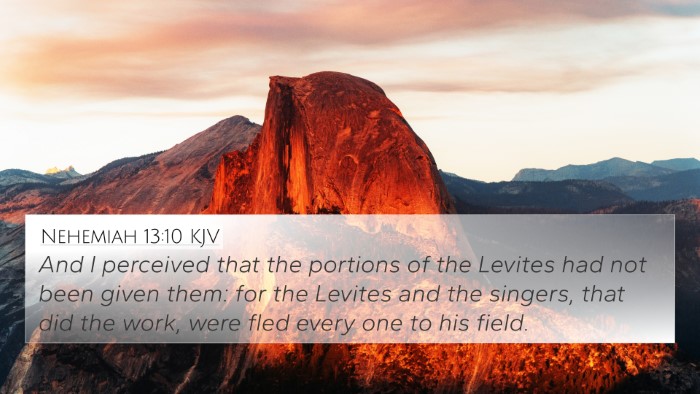Old Testament
Genesis Exodus Leviticus Numbers Deuteronomy Joshua Judges Ruth 1 Samuel 2 Samuel 1 Kings 2 Kings 1 Chronicles 2 Chronicles Ezra Nehemiah Esther Job Psalms Proverbs Ecclesiastes Song of Solomon Isaiah Jeremiah Lamentations Ezekiel Daniel Hosea Joel Amos Obadiah Jonah Micah Nahum Habakkuk Zephaniah Haggai Zechariah MalachiJudges 17:8 Similar Verses
Judges 17:8 Cross References
And the man departed out of the city from Bethlehemjudah to sojourn where he could find a place: and he came to mount Ephraim to the house of Micah, as he journeyed.
Uncover the Rich Themes and Topics of This Bible Verse
Listed below are the Bible themes associated with Judges 17:8. We invite you to explore each theme to gain deeper insights into the Scriptures.
Judges 17:8 Cross Reference Verses
This section features a detailed cross-reference designed to enrich your understanding of the Scriptures. Below, you will find carefully selected verses that echo the themes and teachings related to Judges 17:8 KJV. Click on any image to explore detailed analyses of related Bible verses and uncover deeper theological insights.

Joshua 24:33 (KJV) »
And Eleazar the son of Aaron died; and they buried him in a hill that pertained to Phinehas his son, which was given him in mount Ephraim.

Judges 17:11 (KJV) »
And the Levite was content to dwell with the man; and the young man was unto him as one of his sons.

Nehemiah 13:10 (KJV) »
And I perceived that the portions of the Levites had not been given them: for the Levites and the singers, that did the work, were fled every one to his field.
Judges 17:8 Verse Analysis and Similar Verses
Understanding Judges 17:8
The passage in Judges 17:8 states:
“And the man departed out of the city from Bethlehemjudah to sojourn where he could find a place: and he came to mount Ephraim to the house of Micah.”
This verse introduces an intriguing narrative within the Book of Judges, highlighting themes of spiritual decline, personal agency, and the quest for meaning and belonging.
Summary of Judges 17:8
This verse illustrates a man leaving Bethlehem in Judah to find a new place to stay, symbolizing a search for identity and possibly God’s favor away from the established worship practices.
Insights from Public Domain Commentaries
-
Matthew Henry's Commentary:
Henry notes that the man’s journey reflects a spiritual vacuum in Israel’s history, showcasing a time when individuals sought their own paths to worship rather than adhering to divinely ordained practices. This act signifies moral and religious decline.
-
Albert Barnes' Notes:
Barnes interprets this verse by emphasizing the isolation of the individual versus collective national identity and faith. He underscores that this departure denotes a departure from communal worship, leading to instability and confusion in worship practices in Israel.
-
Adam Clarke's Commentary:
Clarke discusses the importance of location and community for the character's journey. He argues that the move to Mount Ephraim is more than a geographical shift; it represents a search for personal fulfillment amidst a fractured spiritual community.
Thematic Insights
This verse connects deeply with broader themes in the Old Testament:
-
Spiritual Autonomy:
The departure signifies a desire for autonomy, raising questions about the balance between individual pursuits and communal worship.
-
Crisis of Faith:
Judges 17:8 can be seen as representative of the broader crisis of faith within Israel at the time.
-
Search for Identity:
Similar to many figures in the Bible, this character's journey is symbolic of a yearning for true identity and belonging amidst social chaos.
Bible Verse Cross-References
For a deeper understanding, several cross-references highlight the themes in Judges 17:8:
- Judges 18:1 - Further portrays the theme of Israel’s quest for identity and proper worship.
- 1 Samuel 8:5 - Reflects the desire for a king among the people, linking to the broader narrative of Israel's spiritual longing.
- Genesis 19:15 - Similar themes of departure for safety and search for a better life.
- Proverbs 14:12 - Illustrates that a man's way may seem right to him, but it leads to destruction.
- Isaiah 53:6 - Speaks broadly to the wandering nature of God’s people, akin to the journey of the man in Judges.
- Philippians 2:12 - The personal journey of faith, emphasizing individual responsibility in seeking God.
- Luke 15:4 - The idea of searching for something lost, akin to seeking spiritual fulfillment.
- Matthew 7:13-14 - The narrow path as a contrasting symbol to the wide road chosen by many, similar to the man’s choice.
- Romans 8:14 - Affirms that those led by the Spirit of God are children of God, reflecting a search for rightful belonging.
- Hebrews 11:13-16 - The character of faith that entails striving for a better homeland, parallel to the man's exodus.
Conclusion
Judges 17:8 serves as a poignant reminder of the spiritual journeys we each undertake, the importance of community versus self-reliance, and the continual search for true belonging and identity in God. This verse, tied together with its cross-references, lays a foundation for understanding the overarching narrative of faith through personal experience, resonating with many themes within both the Old and New Testaments. The exploration of cross-references in the Bible proves to be a powerful tool in understanding textual relationships and enhancing spiritual study.
Tools for Bible Cross-Referencing
For those looking to delve deeper into scriptures, utilizing a Bible concordance or a cross-reference Bible study guide can provide valuable insights into the connections between various texts. There are several Bible reference resources available that facilitate finding Bible cross-references for sermon preparation or personal studies, enhancing our understanding of God’s word.


